- Home
- Emma Chase
Sustained Page 20
Sustained Read online
Page 20
each one of them—I picture them in my mind. The sound of their voices, their little hands, the way they smell when they come in from outside—like dirt and sunshine and goodness. I try to tell myself they’ll be safer somehow—shielded—if I just keep thinking about them.
But imagination can be a fucked-up thing. I think of all the horrors that I’ve seen, read about, heard about from clients and colleagues. I wonder if the kids are calling for Chelsea, or maybe their parents. If they’re hiding under blankets or crying into pillows because they’re surrounded by strangers and they have no idea what tomorrow has in store.
It’s the longest night of my life.
23
In the morning, I lay Chelsea gently down on the bed, then head into the kitchen. I put a pot of coffee on, let the dog out, and fill his bowl with food. It regards the bowl with sad eyes, then rejects it, curling up in a ball on the recliner with a heavy sigh. I pat his flat ears. “I know just how you feel, buddy.”
I bring a cup of coffee up to Chelsea, put it on the nightstand, and sit on the bed. When I lay my hand on her hip, her eyes flare open with a quick intake of breath, like she’s been yanked out of a bad dream. She looks around, and her face clouds over when she realizes the bad dream is reality. She lies back on the pillow, watching me.
“Thank you for last night. For staying with me.”
“Don’t mention it.” I push a strand of hair behind her ear. “I have to go into the office, to prepare for the hearing on Monday.”
“Okay. Thank you.” Her voice is weighed down. And the unnatural silence of the house closes in around us. “Can I come with you?”
“Of course you can.”
• • •
While Chelsea gets dressed I call Stanton and Sofia, then Brent. I fill them in on yesterday’s events and tell them to meet me at the office. The procedures in family court are slightly different, so I’ll have to familiarize myself with them, but essentially, the custody hearing isn’t so different from a trial. I’ll need evidence and a shitload of case law to back up my argument that the kids belong with Chelsea and that CFSA was way out of line to take them in the first place.
Chelsea comes into the room, sipping her coffee, wearing jeans and a loose red flannel shirt. Her hair shines red-gold in the sunlight from the window, pulled back in a high ponytail.
She looks . . . better, but not good.
The way a china plate that was broken into pieces looks better once it’s glued together. But you know the slightest vibration could shatter it all over again.
We stop for bagels on the way to my apartment, where I change my clothes, and then we head to the offices of Adams & Williamson. Working on Saturday is fairly common there, so there are a few attorneys milling about in casual weekend clothes. I lead Chelsea into my office, where Stanton, Sofia, and Brent are already waiting. After a round of sympathetic hugs for Chelsea and a few arm slaps for me, we sit around my desk.
“They fucking have everything.” I curse, flipping through the social services report that accompanied the court order. And on paper, it doesn’t look good. “Rory’s arrest and his broken arm, Riley getting detained after the party, the stuff with Raymond and Jeremy Sheridan. They even mention Rosaleen’s disappearing act. Did they bug the goddamn house?”
“Probably interviewed the neighbors,” Sofia suggests. “Parents of friends. Chelsea, the report mentions Regan’s speech delay, which CFSA claims you haven’t adequately addressed?”
Chelsea shakes her head. “She doesn’t have a speech delay—all the kids were late talkers. It freaked Rachel out at first, but the pediatrician always said it was totally normal.”
I point at Sofia. “We need to get a statement from the pediatrician. And Rory’s therapist. And their teachers—they’re smart kids, they do well in school; that’ll work in our favor.”
Stanton nods. “And I’ll dig around into Dexter Smeed and CFSA. See what their track record is lately.”
We break up to our respective tasks. Before Brent starts helping Sofia with those statements, he gets Chelsea settled comfortably on the leather couch by the window. He hands her a hot cup of tea, then he takes out his monogrammed flask and pours a shot’s worth into her cup. “A little nip in the morning is a good thing. Gets the blood going.”
“Thank you, Brent.”
“Don’t worry about a thing. They’ve awoken a sleeping giant. And Jake is the scariest giant around.”
• • •
A few hours later I’m in the firm’s library, looking for several volumes among the long, crowded stacks. I feel Stanton watching me as he pulls his own book off the shelf.
“How are you doin’, man?”
“How do you think I’m doing?” I reply without looking up.
“I think you’re all twisted up inside about his. Can’t decide who you want to kill first. That’s how I’d be—if it was Presley.” He pauses, waiting for my response. I pull a book from the shelf and scan its pages. “I just want you to know I’m here for you, Jake. Whatever you need.”
I slam the book closed with a bang, and I glare at him—not because he’s done anything, but just because he’s there. “A kid’s house is like their fortress. It protects them from the boogeyman, or whoever the fuck kids are afraid of nowadays.” My teeth grind. “And they came into their house and they took them, Stanton. You know what that does to a kid?”
He nods. “Yeah, I do.”
I don’t want to talk about this. I just . . . can’t . . . go there right now. “You want to make me feel better?” I push the book in my hands against his chest. “Find me something I can use to walk in there on Monday and nail this fucker to the wall.”
• • •
A few hours after that, I’m at my desk, working on our response to CFSA’s motion for custody. Chelsea’s moved a chair closer to me. She sits, curled up like a kitten, watching me.
“What’s that?” she asks, pointing to a huge mother of a text open on my desk.
“Those are statutes. The laws about child custody.”
She rests her head against her hand. “Why are they written like that?”
“Well, the classic answer is so there’s no room for interpretation. So someone can’t argue it means anything other than exactly what it says. But I think they’re written like that just so lawyers can earn a shitload of money telling everyone else what they mean.”
My answer makes her smile softly. “And what’s that?” She points to another volume on my desk.
“That’s relevant case law. Decisions other judges have made in cases similar to yours. I use that to back up my argument. Judges like to follow the crowd—they’re real all-the-cool-kids-are-doing-it kinds of people.”
She smiles again, blinking slowly, looking totally worn out. I brush her hair back. “Close your eyes, Chelsea. Get some rest.”
And she doesn’t even argue with me.
• • •
It’s dark by the time Chelsea and I get into my car. I bring some files home with me—stuff I’ll work on later—but it seemed like she was done. Couldn’t stand being cooped up in the office for another minute. In contrast to her exhausted demeanor earlier, she seems wired now. Practically vibrating with unspent energy. Desperate.
Her foot taps on the floor of the car. “Can we pick up the dog and stay at your place tonight?”
I don’t have to ask why she’s asking. Without the kids, the house feels like a tomb.
“Sure.”
She nods. “Hey—stop here real quick.” She points at a liquor store up ahead, its sign glowing green neon against the darkness. I pull up to the curb and Chelsea gets out. She returns a few minutes later, a large brown paper bag in tow. When we get to her house, she stays in the car while I grab Cousin It, then we head to my place.
Chelsea sets the dog on the floor in my living room and walks straight into the kitchen. I stand in the doorway, watching her, as she takes two shot glasses out of the cabinet and fills both from the bottle o
f vodka she pulled out of the bag. Her movements are sharp, angry. She downs one shot like a pro and goes back for a second. She breathes out hard after the second shot, then fixes her gaze on me.
She picks up one of the glasses and stalks toward me; a little of the clear liquid sloshes onto the floor as she moves. Her face is serious, hard, and those crystal eyes glow with an almost predatory light. And fuck me if my cock doesn’t respond to the frantic energy pouring from her. I take the glass from her offered hand, and keeping my eyes trained on hers, I swallow the burning liquid down.
Chelsea licks her lips and backs up a step. Then she unbuttons her shirt slowly . . . like a challenge. The shirt hits the floor and her jeans smoothly follow.
“I can’t stop thinking.” Her usually sweet voice is lower, rougher—almost a growl. “I can’t turn my brain off, you know?” Her eyes fall to the shot glass as she pours herself another, but she doesn’t drink it yet. “It’s making me fucking crazy. I don’t want to think at all—about any of this.” Then she looks up at me through long lashes. “Think you can help me out with that?”
I move fast, surprising her. My hand lashes out, gripping the back of her neck. It’s a harsh grasp, forceful, and I drag her closer until her bare skin is pressed right up against me. I pick up the shot glass.
“Open.”
Chelsea’s lips part and I raise the glass to them, pouring the liquid down. As soon as she swallows, my mouth is on hers, crashing and clashing, tasting the sting of vodka and her pain.
I pull back and she’s panting. My other hand skims up her stomach, covering her breast. Her nipple hardens under my palm and I rasp, “Yeah. I know just how to help you with that.”
And neither one of us gets the chance to think the rest of the night.
• • •
Sunday morning, Chelsea wakes up before I do. I feel her move around the room, gathering her clothes, getting dressed, taking care of the dog. She comes back into the room and sits on the edge of the bed, waiting for me to open my eyes. When I do, there’s more life to her features. More . . . determination. And the knot that has been my stomach for the last two days loosens just a little.
“I’d like to go to church today.” The corner of her mouth inches upward. “Rachel and Robbie used to take the kids to church every week, but I haven’t managed it yet. Getting them all dressed and out the door is such a production.” She pauses, probably picturing the kids and all their delightful difficulty in her mind. “But I’d like to go today. Do you want to come with me?”
I’m a pure cynic when it comes to religion. Besides funerals, the occasional wedding, or services on the base with my mother when I was a kid, I don’t do church. But I hear myself say, “Yeah, I’ll go with you.”
We leave Cousin It at Chelsea’s house, where Chelsea changes into a demure short-sleeved yellow dress with matching high heels. I follow the crowd at Mass, the kneeling and standing, but mostly I just watch her. The way her lips touch her hands when her head is bowed in prayer, the serene expression on her face as the priest gives his final blessing.
We stand outside my car in the parking lot of the church. “I don’t know what to do with myself.” Chelsea laughs humorlessly. “All these months there never seemed to be enough time, and now that there is . . . I don’t want it.” She glances my way. “You have that thing you do on Sunday afternoons, right?”
She’s noticed I disappear every Sunday—but she’s never asked me about it. I wonder if she was waiting for me to tell her about it myself.
“Yeah, I do.”
She nods and just as she starts to look resigned to a lonely afternoon, I say, “You want to come with me?”
Her head whips back to me. “Only . . . only if you want me to.”
“There’s someone I want you to meet.”
• • •
I hold Chelsea’s hand as we walk down the halls of the Brookside Retirement Home. Marietta is just exiting the Judge’s room when we get to his door.
“Hey, Jake.” She greets me with a wide smile.
“Hi, Marietta. How’s he doing today?”
“Oh, honey, he’s having a really good day.”
I blow out a relieved fucking breath. The last thing I wanted was to make Chelsea more depressed than she’s been—and the Judge on a bad day is not a happy sight.
I nod past her and walk into the room with Chelsea just behind me.
He’s reading in his leather chair by the window, dressed in a dark blue sweater and tan slacks, those ugly brown loafers on his feet.
“Hey, old man.”
His face is alight, his eyes confident and wonderfully aware. “Jake!” He closes his book and rises, wrapping me in a strong-armed hug. “It’s good to see you, son. How are you?”
“I’m doing good, Judge.”
His eyes fall to Chelsea and he throws me a wrinkled smirk. “I can see why.” He offers her his hand. “Hello, my dear, I’m Atticus Faulkner.”
Chelsea shakes his hand with a huge smile. “I’m Chelsea McQuaid . . . it’s wonderful to meet you. Jake’s told me all about you.”
“Salacious lies, I’m sure.” He winks. “Sit down, sit down. Let me get you some tea, Marietta just brought me a pot.”
Once we’re seated, with our cups in front of us, the Judge tells Chelsea, “You are beautiful, my dear.”
And cue the blush. “Thank you.”
“Now, I must apologize in advance, Chelsea, if I say or do anything that makes you uncomfortable. I . . . forget things . . . very quickly and often lately.”
Chelsea smiles—and she’s more lovely than any of the saints on her church’s stained glass windows. “Don’t worry. If you forget, we’ll be here to help you remember.”
And for the fucking life of me, I don’t know how she’s gotten by without filing a shitload of restraining orders, or without gifts and cards and flowers clogging up her mailbox every day. Because as I watch her with the Judge, I don’t know how anyone could know her and not ridiculously, pitifully love her.
• • •
Later that night, Chelsea and I are back at her house . . . soaking together in the oversized bathtub off of her bedroom. She sits in front of me, her back against my chest, her hair pinned up, a few damp strands hanging down, tickling my face. She’s been quiet for a while now—only the sounds of the water rippling against the side of the tub disturb the silence.
“What if we lose tomorrow?”
My lips linger on her shoulder. “We won’t.”
“But what if we do? Will they”—her voice cracks—“will they let me see them? Have visitation?”
She turns around to face me and I choose my words carefully. “I know people . . . who can find out where the kids are. And I know other people who make IDs—passports and stuff. Good ones.” I trace my finger along her jaw. “So . . . if we lose, I’ll call those people. You’ll take out any money you can . . . and you’ll just go.”
“Like . . . to Mexico?”
I chuckle. “No. The glowing-white McQuaid skin would burn to a crisp under the Mexican sun. Maybe . . . Canada? I wonder if Regan would pick up French faster.”
Chelsea stares at me, and her eyes seem a shade darker. Deeper. “You would do that for us?”
My fingers splay across her soft cheek. “I can’t think of anything I wouldn’t do for you.”
And that fact scares the ever-loving shit out of me.
The water tips over the edge of the tub as she rises up on her knees, straddling my hips. We kiss for minutes that feel like hours. Her hand dips below the water, stroking me even though I’m already hard and hot in her palm. And when she lines us up, sinks down, it’s slow and gentle. My arms wrap around her, pulling her closer, closer, and I kiss her breasts, toying with her nipples with my tongue. Her hips rise and fall; I move within her at a steady, unhurried pace.
And when she spasms around me with a tender whimper, when I pulse deep inside her with a rough groan, it feels like more. Like everything. Like nothin
g I’ve ever had before and something I can’t fathom reaching with anyone else.
Chelsea’s head still rests on my shoulder long after the water turns cold. Eventually, we climb out of the tub, dry each other off, and fall asleep in her bed wrapped around each other.
24
Ten a.m. the next morning, Chelsea and I walk into courtroom 7-A in the Family Court of the District of Columbia. We take our place at our designated table; Stanton, Sofia, and Brent sit in the front row behind us. Chelsea is nervous but composed. And me? I’m ready and I’m hungry for a win. It’s the feeling I always get. No nerves—just eagerness.
The attorney representing the Children and Family Services Agency takes her own place at the table across the main aisle to my left, smoothing down the skirt of her conservative, well-tailored black suit. She’s a redhead in her forties who looks almost as confident as I feel.
The bailiff announces that court is in session and we all rise as the judge—a gray-haired, spectacle-wearing woman who, if the lace around her collar is any indication, is a fan of Ruth Bader Ginsburg—enters the room. She goes through the formalities—who’s representing who—then she asks me to begin.
“I call the director of CFSA, Dexter Smeed, Your Honor.”
Dexter Smeed looks exactly like you’d picture someone named Dexter Smeed to look. Round glasses; thinning hair; pressed, starched white button-down shirt; brown tweed jacket; and light green bowtie. He’s sworn in and takes a seat in the witness box.
“Mr. Smeed, have you ever seen Chelsea McQuaid before today?”
“No.”
“Ever met her, visited her home?”
“No.”
“Sent her an email?”
Smeed clears his throat. “No.”
I nod, taking it in. “Have you ever interviewed any of the McQuaid children?”
“No.”
I step out from behind the table and lean back against it. “And yet you felt qualified to override the recommendation of the social worker on the case, Janet Morrison—who has seen, visited, and interviewed Miss McQuaid and the children—to order the removal of custody?”
“I did, yes.”
“And how did you make that determination, Mr. Smeed?”
“I periodically review the files of all the case workers in my agency. The file contained all the information I needed. It’s my job to be critical. To determine who is a fit guardian”—his eyes scan to Chelsea and pause meaningfully—“and who is not.”
Toast. This fucker is toast—the burned kind that not even the dog will touch.
I move to the right, blocking Chelsea from his view. “Your wife is a lucky woman.” I shake my head. “You have got some set of balls—”
“Your Honor!” The agency attorney jumps to her feet.
The judge lowers her chin, glaring down. “That comment will cost you five hundred dollars, Mr. Becker. You will maintain proper decorum in my courtroom or your client will be looking for new representation. There won’t be another warning—do I make myself clear?”
Most judges are really low on sense of humor.
“Crystal clear. My apologies.”
Then I set my sights back on Mr. Smeed. “Let’s come back to that later. At the moment, can you tell me if the name Carrie Morgan is familiar to you?”
He thinks for a moment, then shakes his head. “No.”
I pick up a file from the table and glance at its contents. “Three years ago, Carrie, age seven, was taken into the custody of Children and Family Services after her mother was convicted on federal drug charges. She was placed with a foster family, under the supervision of your agency. Six months later, she was dead, from blunt-force trauma to the head. The autopsy found signs consistent with abuse.” I pin him with a stare, my eyes as cold as my voice. “Ring any bells?”

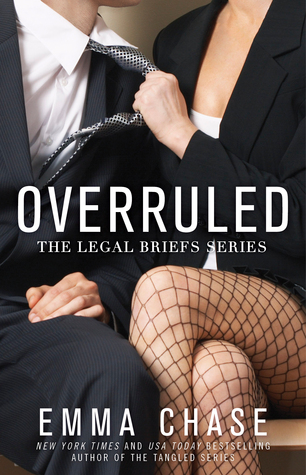 Overruled
Overruled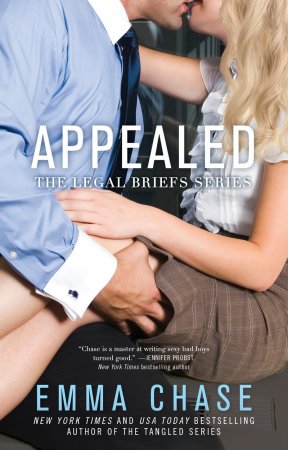 Appealed
Appealed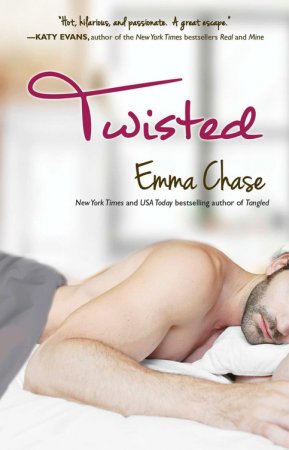 Twisted
Twisted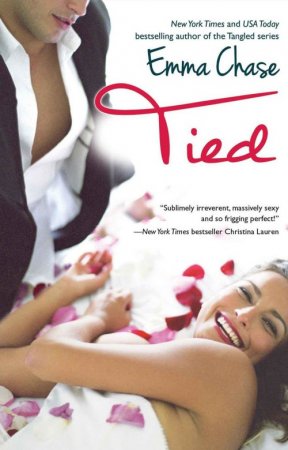 Tied
Tied Royally Screwed
Royally Screwed It's a Wonderful Tangled Christmas Carol
It's a Wonderful Tangled Christmas Carol Tangled
Tangled Tamed
Tamed Sidebarred
Sidebarred Sustained
Sustained Tangled Extra Scenes
Tangled Extra Scenes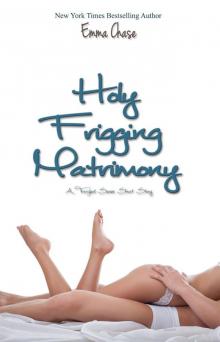 Holy Frigging Matrimony: A Tangled Series Short Story
Holy Frigging Matrimony: A Tangled Series Short Story Getting Schooled
Getting Schooled Royally Matched
Royally Matched Royally Endowed
Royally Endowed Royally Raised
Royally Raised Dirty Charmer
Dirty Charmer Getting Played (Getting Some Book 2)
Getting Played (Getting Some Book 2) Royally Yours
Royally Yours